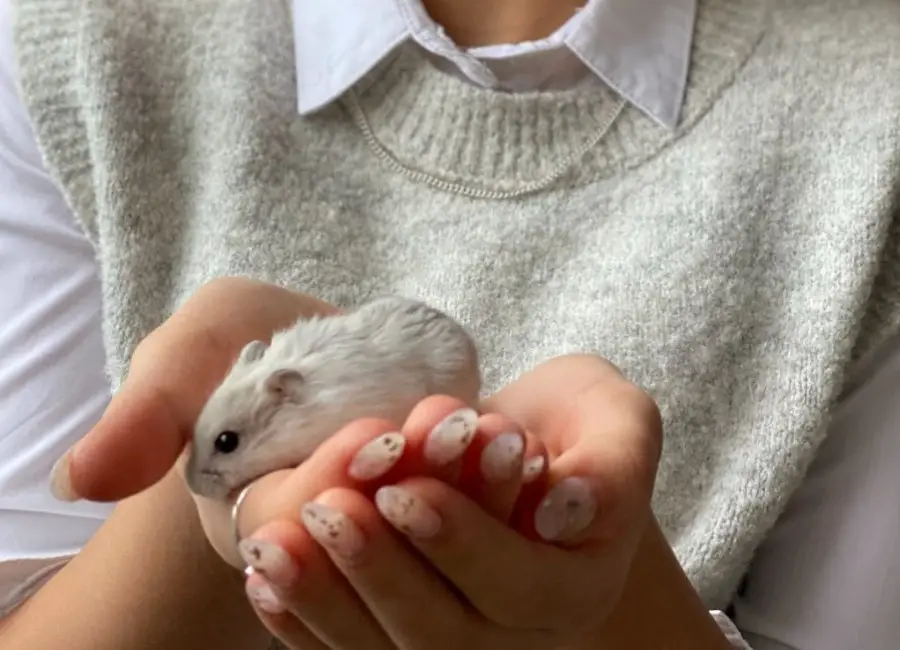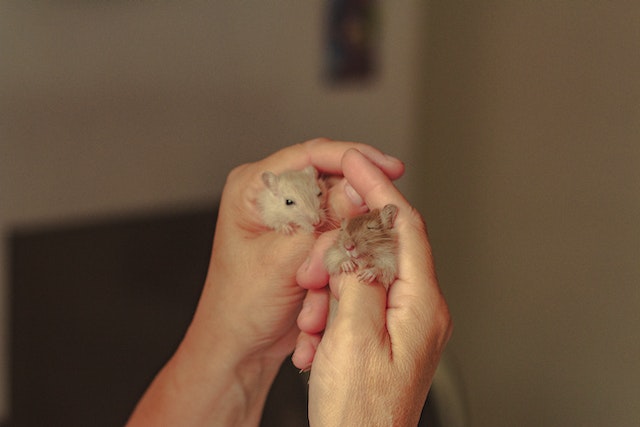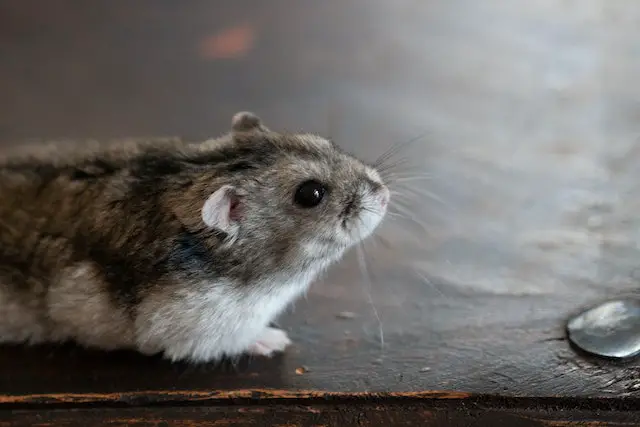13 Reasons Why Hamsters Are Good Pets

Do you know that hamsters are good pets for people who live in small spaces or apartments, even people who live in cities can enjoy having a hamster!
In this post, we will outline and discuss some of the most common reasons why hamsters are good pets regardless of what you think.
If hamsters are bad pets, they won’t be as popular as they are, even though they bite it’s usually due to poor socialization or training.
Why Hamsters Are Good Pets
Hamsters are excellent pets for a variety of reasons, including their tiny size, ease of maintenance, and enjoyment of interaction with their keepers.
They don’t need a lot of room and are exceptionally clean creatures. Hamsters are also incredibly sociable creatures that frequently relish time spent with their owners.
Hamsters are also quite affordable to keep as pets and require little maintenance.
They are a fantastic option for anyone searching for a devoted friend because of all these features.
Let’s break it down further…
Reasons Why Hamsters Are Good Pets

There are a variety of reasons why someone would want to get a hamster as a pet, including the following:
1. Hamsters don’t need lots of space
Hamsters, unlike dogs, cats, and even rabbits, only need a few square feet to live comfortably.
A hamster cage may easily fit on a desk or cabinet, making it a perfect pet for those who live in small flats or houses.
Don’t be scared to take your hamster outside on a regular basis for some exercise if need be.
When hamsters are monitored, they like exploring.
Getting them a hamster ball is a great way for them to burn off some steam. It’s also a lot of fun to watch them go about it.
City dwellers and people with small spaces can own hamsters without stress.
2. Hamsters are charming and lively
Many pet owners believe hamsters to be one of the most entertaining and charming pets to have.
Standing near your hamster cage and watching him play with the hamster wheel might help you relax.
When you go home from work and are stressed, do you need to feel better? Simply stand near your hamster and see it at work, and you will become relieved.
Most hamsters are so cute that you’ll want to remain with them all day and snuggle or play with them.
3. Hamsters do not shed
Because hamsters do not shed, they should be suitable for anyone with allergies to hair.
Because there won’t be any stray hamster hairs, there won’t be any need to brush your clothes or furniture on a regular basis.
The only mess a hamster will cause in your home is stray bits of bedding in odd places, but that’s it.
With dogs or cats, you will have to deal with fur or hair everywhere, even in your food and clothes.
If you ever lived with a shedding dog or cat, you will definitely learn to appreciate a hamster.
With hamsters, you will not worry about allergies or hairs scattered in your home.
4. Hamsters are healthy pets

Do you want a pet that won’t have you go to the veterinarian every month? Then you’re covered by owning a hamster.
These little rodents are usually healthy during their brief lives if they are kept in a suitable cage and fed a nutritious diet.
They are in the most acute danger of suffering injuries as a consequence of falling, thus they must be handled with care.
You will also devote lots of time to caring for them to avoid unnecessary health challenges associated with hamsters.
5. Hamsters don’t need a lot of training
Hamsters, unlike cats, dogs, or other pets, do not require much intensive or extensive training.
Litter box training and obedience classes are unnecessary when it comes to hamsters, and no puppy classes as well.
Regular stroking and interaction, on the other hand, benefit hamsters in getting to know you.
If you want a low-maintenance furry buddy, a hamster could be the right pet for you. All you need is just the right taming process.
6. Hamsters don’t need to go for daily walks
Are you looking for a pet that can exercise itself on a regular basis? Then you’re covered by hamsters.
Daily activity is required for hamsters. The good news is that you can get them a hamster wheel to run on.
If her cage doesn’t have a wheel for her to run on, consider buying her a hamster ball.
Never, under any circumstances, let your hamster alone in a ball, always supervise.
Hamsters aren’t like dogs or cats in that they don’t need to be leashed trained or walked every day for exercise.
A hamster wheel is enough to give your hamster the required daily exercise.
7. Cages for hamsters don’t need daily cleaning
Are you seeking a cute pet that won’t require you to clean its cage every day? Then hamsters will take care of you in that aspect.
Depending on the type of cage you keep your hamster in, you should spot-clean her bedding once a week and replace her whole bedding once a month.
When you consider that cats’ litter boxes are cleaned every day, which takes more time, this is a lot less labor.
8. Hamsters do not require continual supervision
Hamsters prefer to be left alone in their cage, even if they can spend quality time with their owners if they have enough space and entertaining toys.
You don’t need time for training, daily walks, or elaborate grooming sessions to care for a happy hamster.
They don’t need as much human interaction as dogs and cats do.
Failure to socialize your hamster, especially early in its life may cause it to become more timid or fearful of being touched.
9. Professional grooming is not required for hamsters
Do you have a hard time sitting down and grooming your pet on a daily basis? Then hamsters are the perfect pet for you.
Hamsters groom themselves often, up to many times each day, and they don’t require a professional groomer to keep themselves clean.
It is not required to bathe, comb, or otherwise augment your pet hamster’s grooming routine.
Unlike dogs and cats, hamsters do not need to be groomed by a professional and can groom themselves.
10. Hamsters aren’t known for making loud noises like barks
Do you live in a city where your neighbors don’t enjoy or complain about pet noises all of the time? Then you should get a hamster as a pet.
Hamsters are recognized for being quiet and tranquil pets; unlike other pets, they do not bark or meow.
People in certain places don’t keep pets because of the noise; however, because hamsters don’t create loud sounds, you won’t notice their existence.
Dogs can bark and neighbors don’t enjoy this type of loud sound, but with hamsters, you only hear the sound of the hamster wheel when they run on it.
11. Hamsters are a low-cost pet to own
A hamster is not just low-maintenance but also affordable.
Despite the fact that all of the goods necessary to care for a happy hamster must be included in the total cost, the final cost will be significantly less than adopting a cat or dog.
Once the initial one-time costs, such as the cage, are covered, keeping hamsters is rather affordable.
Each month, you won’t be spending much on hamster food, treats, or bedding.
Of course, like with any pet, unanticipated costs, such as vet bills, must be factored into your budget.
12. Hamsters are a hygienic pet

Do you want a pet that won’t have you get up early in the morning to clean litter boxes or pick up poop? Then a hamster is required.
Hamsters have only one toilet in their cage, unlike most other rodents, making them very easy to clean.
They’re also incredibly clean, always fussing with their fur. This removes the need for any pet bathing on the part of their human companions.
Hamsters spend a lot of time grooming themselves, and they always appear clean.
13. Hamsters are never mad at owners
Do you want a pet that will never be angry with you? Then you should look into getting a hamster.
Once they’ve been properly hand-tamed, golden hamsters form strong bonds with their owners.
They rely on their owners for companionship and interaction, as opposed to other hamsters.
Chinese hamsters may form great bonds with their owners, but they can thrive in groups (unlike the Golden).
The bigger size of the Golden hamster makes it easier to handle than the smaller varieties.
Who should own a hamster?
Hamsters can make excellent pets for individuals who are willing to provide the necessary care and attention they require throughout their lives.
However, whether or not someone should own a hamster ultimately depends on their ability and willingness to meet their needs, which can include providing suitable living space, proper nutrition, exercise opportunities, and regular veterinary care.
Therefore, owning a hamster is not a decision to be taken lightly, and individuals should carefully consider their ability to provide for these needs before bringing home a pet hamster.
Learn more about identifying a hamster that likes you.
Related Questions
Why are hamsters good pets?
Hamsters are great pets for many reasons. First and foremost, they’re adorable and fun to watch as they run on their wheels and play with their toys. Additionally, they’re relatively low-maintenance pets that don’t require a lot of space or time commitment, making them a great choice for busy people or apartment dwellers.
How long do hamsters typically live?
Hamsters can live anywhere from one to three years, depending on their breed and living conditions. With proper care and attention, however, you can help your hamster live a long and healthy life.
What kind of housing do hamsters need?
Hamsters need a cage that is at least 12 inches by 24 inches, with a solid bottom and good ventilation. They also need bedding material to burrow in and toys to play with, such as an exercise wheel. It’s important to keep their cage clean and provide fresh food and water daily.
Are hamsters good pets for kids?
Hamsters can make great pets for kids, but it’s important to supervise them and teach them how to handle the hamster gently. Hamsters can bite if they feel threatened, so it’s important to approach them slowly and calmly.
What do hamsters eat?
Hamsters are omnivores and need a varied diet of pellets, fresh vegetables and fruits, and occasional protein. Some foods to avoid include sugary treats, citrus fruits, and onions.
Can hamsters be trained?
Yes, hamsters can be trained to a certain extent. They can learn to recognize their owner’s voice and might even come when called. They can also be trained to use a litter box or to walk on a leash. Like with any pet, training takes patience and time.
Conclusion
If you live in a small space or apartment, then a hamster is the right pet. If you want a pet that can stay alone for long without you then get a hamster.
When hamsters are happy with you, there are many signs of a happy hamster you should know, and it will help you bond more with your hamster.
Hamsters are generally good pets that require little exercise and care, however, hamsters require taming to avoid unnecessary biting.
Hamsters are good pets for both single persons or family members who are not always home.
